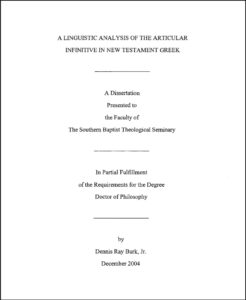I have added eight works by Mark Janse to my Comprehensive Bibliography of Hellenistic Greek Linguistics. (Thanks to Mike Aubrey for providing the bibliographic information on six of them and a lead to the seventh.)
Dr. Janse is Research Professor in Asia Minor and Ancient Greek at Ghent University. He has written extensively about the history of Greek and related issues in Linguistics. The publications that I have added to the bibliography are ones that consciously apply a specific insight from Linguistics to the study of Greek from the Hellenistic period, or in one case from the Classical period where no similar work has yet been published for Hellinistic Greek.
Here are the items I added:
Janse, Mark. “Aspects of Bilingualism in the History of the Greek Language.” In: J.N. Adams, Mark Janse & Simon Swain (eds.), Bilingualism in Ancient Society. Language Contact and the Written Word. Oxford: Oxford University Press, 2002, 332-390.
________. “The Distribution of the Enclitic Personal Pronouns in New Tetament Greek in the Light of the Septuagint and the Modern Greek Dialects of Asia Minor: A Structural-Functional Analysis.” PhD. dissertation: Ghent University, Department of Latin and Greek.
This dissertation is available from Dissertations Abstracts International 58 (1997) 776-C. Ann Arbor, MI: University Microfilms International.
________. “La phrase segmentée en grec ancien. Le témoignage des enclitiques.” Bulletin de la Société de Linguistique de Paris 86.1 (1991) XIV-XVI. Paris: Klinck sieck.
________. “La position des pronoms presonnels enclitiques en grec neo-testamentaire a la lumiere des dialectes neo-helleniques. In C. Brixhe ed. La koine grecque antique I (1993), 83-121. Nancy: Presses Universitaires de Nancy.
________. “Phonological Aspects of Clisis in Ancient and Modern Greek.” Glotta 73 (1995-1996) 155-167. Göttingen: Vandenhoeck & Ruprecht.
________. “The Prosodic Basis of Wackernagel’s Law.” In André Crochetière, Jean-Claude Boulanger & Conrad Ouellon (eds.), Les langues menacées. Actes du XVe Congrès international des linguistes, Québec, Université Laval, 9-14 août 1992. Sainte-Foy: Presses de l’Université Laval, 1993, Vol. 4, 19-22.
Originally presented as a paper at the 15th International Congress of Linguists, Quebec, August 9 to 14, 1992.
Creve, Sam, Mark Janse, and Kristoffel Demoen, “The Pauline Key Words πνεῦμα and σάρξ and their Translation.” Filología Neotestamentaria. Vol. 20 (2007), 15-31.
Mike Aubrey has himself done a good amount of work on Hellenistic Greek Clitics and reached similar conclusions. He has posted several discussions at ΕΝ ΕΦΕΣΩ.
 I have added Dennis Ray Burk’s doctoral dissertation “A linguistic analysis of the articular infinitive in New Testament Greek” to the bibliography.
I have added Dennis Ray Burk’s doctoral dissertation “A linguistic analysis of the articular infinitive in New Testament Greek” to the bibliography.